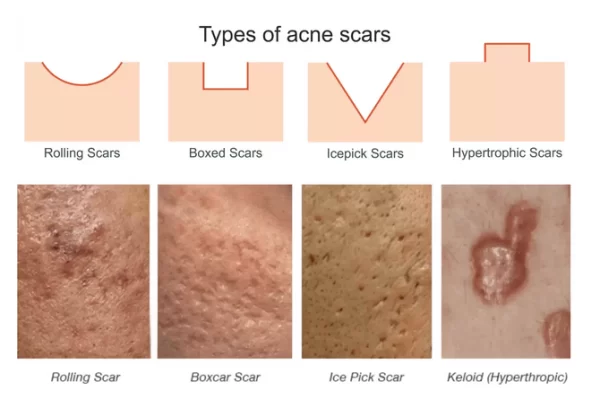By : Geraldus Sigap
![10 Best Acne Treatment Clinics In Singapore [As Of 2023]](https://cdn.prod.website-files.com/62bbdfb189b700c02f7d4865/64367562ec653af3717b45e6_acne-removal.jpg)
Acne scars can often be a lingering skin issue that affects confidence. Even after the acne has healed, the marks left behind may remain for years. But don’t worry, by understanding the types of acne scars and getting the right treatment, you can work toward smoother, clearer skin.
What Are Acne Scars?
Acne scars are changes in the skin caused by inflammation from acne that damages skin tissue. They differ from post-inflammatory hyperpigmentation, as acne scars often cause depressions or uneven skin texture.
Types of Acne Scars
Understanding the type of scar you have is crucial for choosing the right treatment:
- Ice Pick Scars: Deep, narrow, pitted scars—usually the most difficult to treat.
- Boxcar Scars: Round or oval depressions with sharp edges that appear shallow.
- Rolling Scars: Wavy depressions that create an uneven skin surface.
- Keloid and Hypertrophic Scars: Raised scars from excessive collagen production during healing.

Figure 1. Types of Acne Scars
How to Treat Acne Scars
Treatment depends on the scar type and severity:
- Microneedling: Stimulates collagen regeneration to smooth out scars.
- Chemical Peeling: Exfoliates dead skin and encourages new skin growth.
- Fractional CO2 Laser: Effective for ice pick and boxcar scars.
- Subcision: Releases tethered scar tissue beneath the skin.
- Dermal Fillers: Temporarily fill in depressed scars.
- Dermatologist Consultation: Essential for accurate diagnosis and choosing the best treatment.
Can Acne Scars Disappear Completely?
With consistent and proper treatment, most acne scars can significantly improve. However, results vary depending on skin type and treatment method.
Don’t let acne scars lower your confidence. Consult a dermatologist to find the most suitable therapy for your skin. Don’t hesitate to reach out to the Dermatology Department at RS Abdi Waluyo by calling 021-3144989 or schedule your appointment online through the following link: https://wa.link/rsabdiwaluyo
FAQ
- What’s the difference between acne scars and dark spots?
Acne scars affect skin texture, while dark spots (post-inflammatory hyperpigmentation) only change skin color without texture alteration.
- Can all acne scars disappear completely?
Not all scars will vanish entirely, but many can fade significantly with proper treatments like lasers, microneedling, or chemical peels.
- What is the fastest treatment for acne scars?
CO2 fractional laser and microneedling with PRP are among the most effective for quickly improving skin texture, though results vary by scar type.
- Can face creams remove acne scars?
Topical creams may help lighten discoloration or prevent deeper scars, but are less effective for established textural scars like ice pick or rolling scars.
- When is the best time to treat acne scars?
The ideal time is after active acne is under control and no inflammation is present. If acne persists, treat that first before addressing scars.
Resource
- Bay Clinic. Acne scars removal Singapore [Internet]. Singapore: Bay Clinic; c2025 [cited 2025 Aug 11]. Available from: https://www.bayclinic.sg/concern/acne-scars-removal-singapore/
- Connolly, D., Vu, H. L., Mariwalla, K., & Saedi, N. (2017). Acne Scarring-Pathogenesis, Evaluation, and Treatment Options. The Journal of clinical and aesthetic dermatology, 10(9), 12–23.
- Fabbrocini, G., Annunziata, M. C., D’Arco, V., De Vita, V., Lodi, G., Mauriello, M. C., Pastore, F., & Monfrecola, G. (2010). Acne scars: pathogenesis, classification and treatment. Dermatology research and practice, 2010, 893080.
- Jfri, A., Alajmi, A., Alazemi, M., & Ladha, M. A. (2022). Acne Scars: An Update on Management. Skin therapy letter, 27(6), 6–9.
